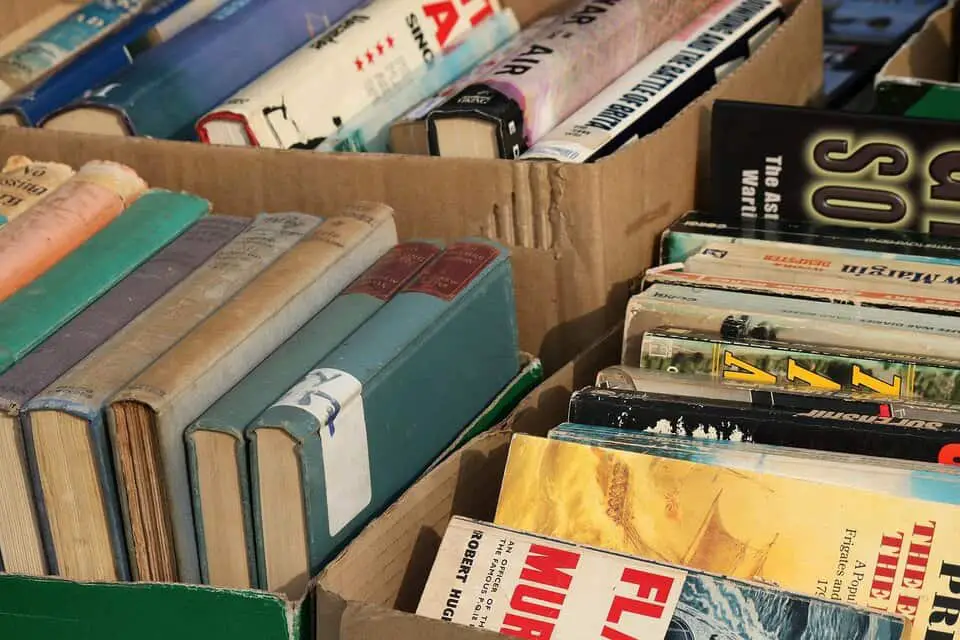Many libraries have a limited amount of space. I grew up with a great small town library but even their new building had only so much space for book shelves, new books, and even storage for boxes of books when they had their annual fundraising sale. So with constant new titles coming in, how do they make more room? What happens to old books that just don’t get checked out anymore?
There are actually multiple answers to this question based on library location, policy, space, and in some cases, the cheekiness of librarians who refuse to see any books simply “thrown away” due to lack of recent checkouts (a story we’ll get a lot more into later in this article). Because there are so many new books of interest to readers, libraries do need to find a way to rotate old, less checked out books out and bringing new ones in.
There are multiple options, and many libraries have multiple practices when it comes to dealing with old books, especially when new room is needed. Let’s jump into those options to learn more!

The Famous Book Sale Fund Raiser
Most libraries rely on book sales as a way of raising additional funds for expenses and programs put on throughout the year. This is a win-win situation where voracious readers rush in for great deals on books to engorge the at-home library while the library gets rid of books that are rarely or never checked out, in addition to books that were donated or in storage that there just isn’t room for or aren’t what’s wanted for check out inventory.
Even small town library book sales are amazing things, and I remember my hometown library having two a year. Sometimes it was a dime per paperback, a quarter per hardcover (5 for $1), and sometimes towards the end of the sale or even for a whole sale when they had too many books to store there was a “suggested donation” where you could take as many of anything you wanted and just slipped what you thought was fair into a donation box.
This is a great way to get rid of excess books, especially those that are never checked out, aren’t really in good enough condition to be leant out, or if like many libraries they prefer hardcovers or thicker paperbacks versus mass market paperbacks, it’s a way to get rid of the easily to damage mass market paperbacks.
Not to mention the fact that these fund raisers tend to do very well in creating funds for the local library.

The Ghost Library Patron
One of the stories that has taken off on social media, and has to create a smile on the faces of many a booklover, involve the actions of some wily librarians. In some libraries policies were put into place saying that any book not checked out for a year (or some other length of time) had to be gotten rid of, the response by librarians was to add a patron into the system, give them a library card, and have this ghost patron check out every book that happened to be on the way to a chopping block.
This delightful story has popped up many times and takes many forms, but the long and short of it is that stories of librarians creating library cards to refuse to allow the mass dropping of books from an active library’s collection is a pretty cool and clever solution to make sure a political agenda doesn’t gut such an important public institution.
So the ghost library patron is a popular way to avoid getting rid of books that haven’t outlived their shelf lives yet at libraries.
Donations to Organizations or Schools
Sometimes there just isn’t enough space and libraries can often see benefits from donations. These can be donations to school libraries (especially in smaller towns), to Rotary or service organizations that then have book sales to raise funds, or for special events like charity.
There are many options for donating books and while it can take a little bit of work to arrange and setup everything for a charity donation to places that need the books more, it is a great way to get rid of excess books in one area that would be treasured as much needed resources in others.
These donations, whether to local organizations or donations to distant places via charity, can be a great way for libraries to get rid of excess books in a way that benefits everyone involved.
Giveaways
Once in a while there are free giveaways of books. Boxes marked “Free Books” in the open, towards the front can provide a smart way to get rid of those excess books and offer a way to encourage reading. This is a win-win for all involved, and was a way that many small town libraries get rid of extra books that didn’t sell during a fundraiser or library sale.
These giveaways are an excellent way to get as many books into the hands of people who can actually use them before having to resort to last ditch measures when there just aren’t other ways to get rid of books. Libraries prefer to give away old books before ever having to take more drastic measurements to open up limited space which brings us to the next section…
They Keep Them (In Some Cases)
The age of the book doesn’t necessarily matter. If a hardcover book is 40 years old but still gets checked out then the library just keeps those old books. The main considerations here are the condition of the book.
- Older books might be kept if they are in good condition and hard to replace
- Older books might be kept by the library if they are popular
- Older non-fiction books might be kept by the library to keep good research material on a variety of non-fiction topics
After all, if the book is still popular and still in good enough shape to be checked out then why not keep it on the shelves, especially if it’s still popular and seeing some use?
However, for all the old books that don’t get any attention or love, they are unlikely to stay on the shelves as the library will need to move them off limited shelf space in order to make sure there is room available for the many new books that are always coming out and that will need their own time on the shelves.
Recycle Bin
While this is the last resort for libraries that need to get rid of old excess books, but sometimes there’s just no room for books in the library and no takers for the orphan books. In that situation sometimes all that’s left is the recycle bin.
While throwing away books is something a library just doesn’t like to do, sometimes that is the only last resort option that is actually available. Libraries would definitely be more likely to pursue all other options first, but when it comes to just having to get rid of books then the recycle bin (hopefully paper recycling over truly throwing them away) might be the last option for getting rid of unwanted books there just aren’t any rooms for.
In Conclusion
Each library is going to be a little bit different and have their own policies, and the sheer number of different routes they take makes it worth talking to individual librarians from location to location on how they handle old books goes to show the options that libraries have in how to deal with them and manage the limited space that they have.
Other Articles You May Enjoy
